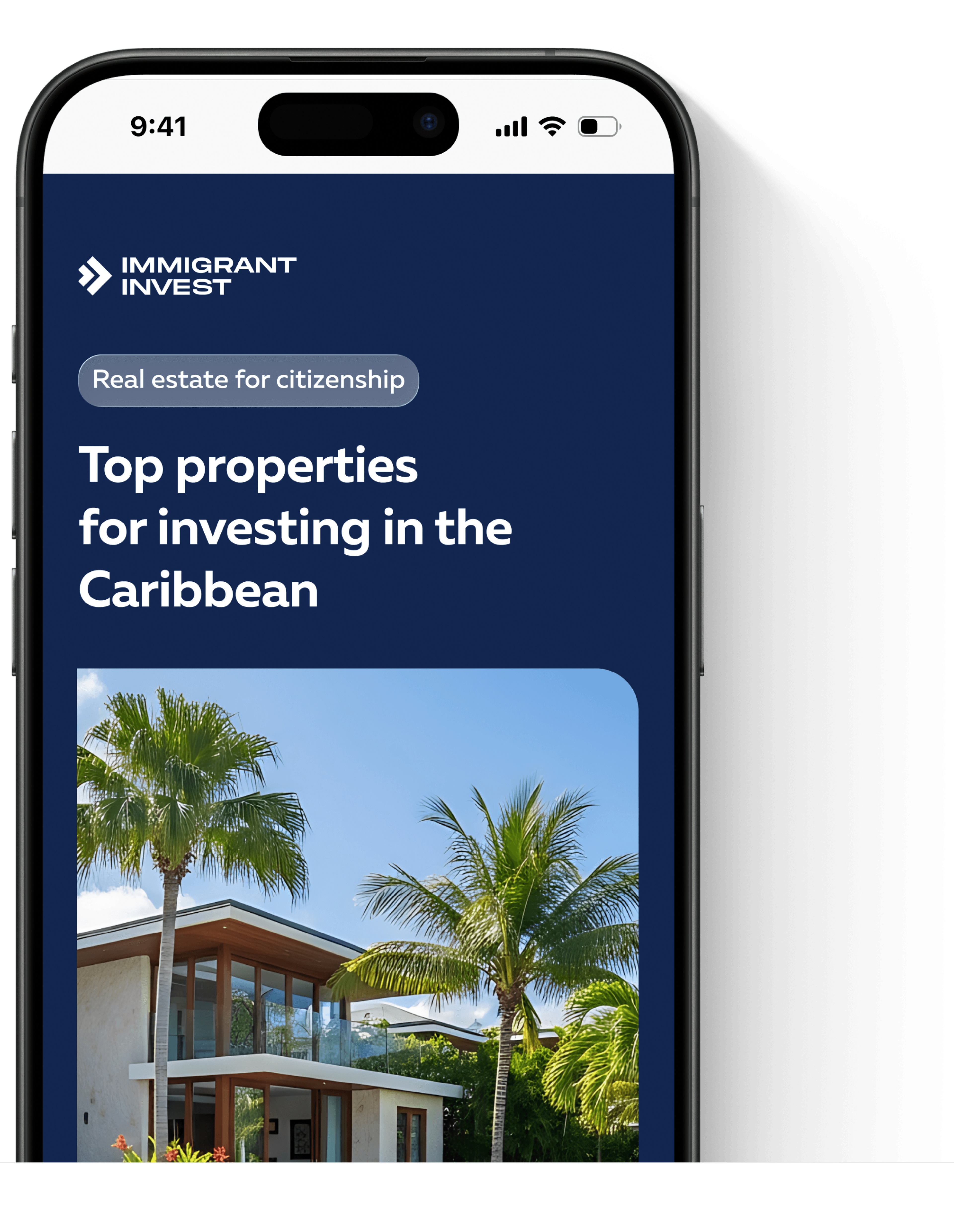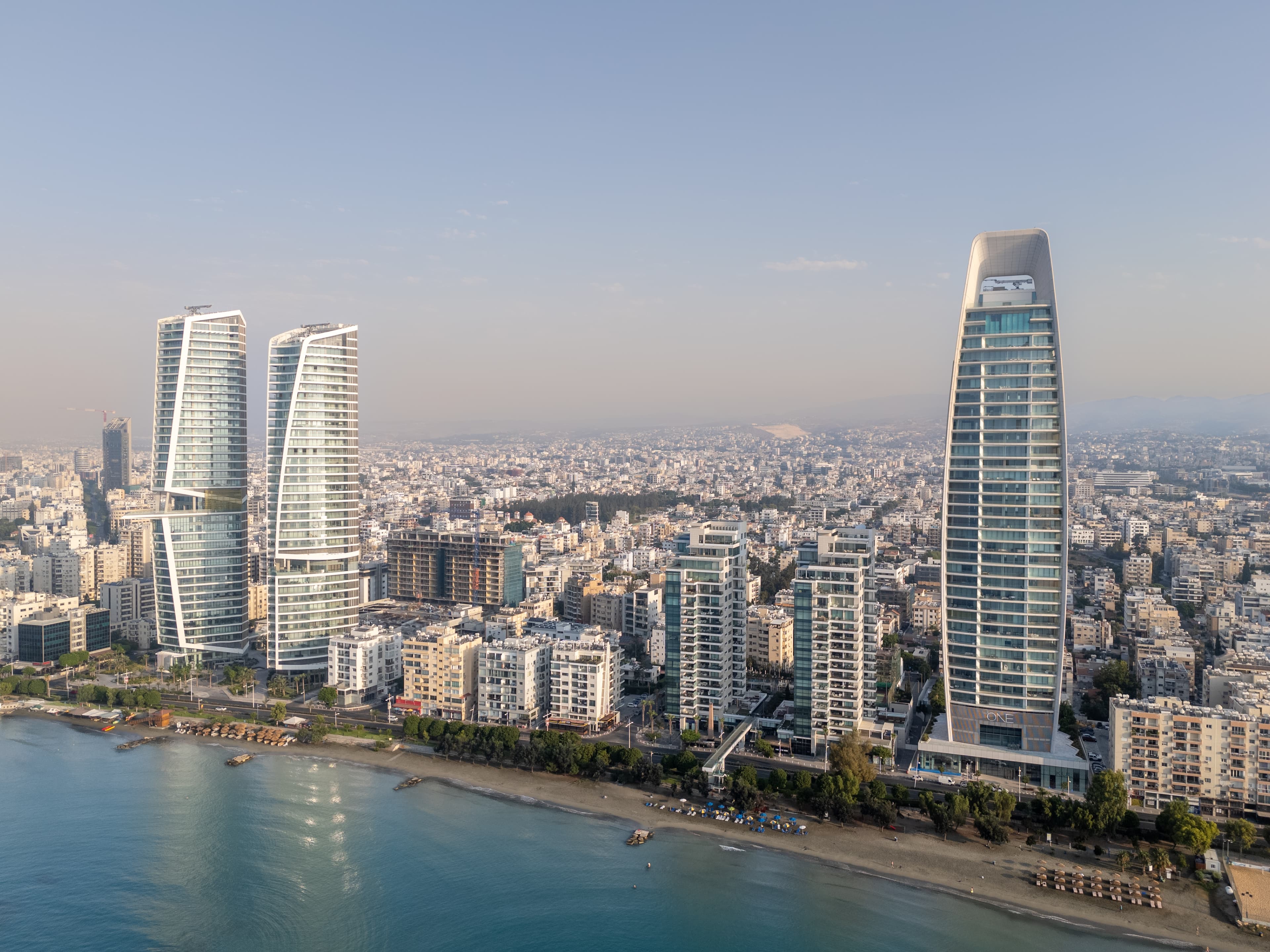Summary
Entrepreneurs get Caribbean passports by investment to develop their business and transfer assets to more convenient tax jurisdictions.
There are no capital gains or inheritance taxes in the Caribbean. Residents of some states do not pay income and property taxes.
We discuss the general taxation principles in the region and tax rates in five countries: St Kitts and Nevis, Antigua and Barbuda, Grenada, St Lucia and Dominica.
Who pays Caribbean taxes
The taxable items and tax rates depend on whether a person or a company is a tax resident.
Tax residents are individuals who live in a Caribbean country for more than 183 days a year. Otherwise, they are not tax residents.
To permanently live in a Caribbean country and become a tax resident, you need a residence permit, permanent residence, or citizenship. The fastest way is to get a passport by investment.
Signs of tax residency for individuals are listed in the Ernst and Young report:
-
residing in the state for at least 183 per year;
-
a valid registration address in the country;
-
social, economic, political or cultural activities on the country’s territory.
All companies registered in the country or managed by a country structure are tax residents.
Non-residents pay taxes if they have a source of income in a Caribbean country.

Trusted by 5000+ investors
Compare the Caribbean and Vanuatu citizenship by investment programs
Taxes for individuals
There are no inheritance or capital gain taxes in the Caribbean. Taxes on income, dividends, royalties and interest, and social contributions are the main taxes paid by individuals in the Caribbean countries.
Income tax is not paid by residents and non-residents of Antigua and Barbuda and St Kitts and Nevis. In other Caribbean countries, income tax is calculated on a progressive scale.
Income tax rates are the same for residents and non-residents. The difference is that residents pay tax on all their income, while non-residents only pay income from sources in the country.
Income tax in the Caribbean countries
Taxes on dividends, royalties and interest are not paid by all Caribbean tax residents except for St Lucians. The St Lucia tax rate on interest and royalties is 10% for income from the country’s sources.
Non-residents who receive dividends, royalties and interest from a source in the country pay taxes too. Exceptions are interest and royalties in Grenada and dividends in St Lucia.
Tax rates for non-residents individuals
Social contributions from wages received from a source in the country are paid by tax residents and non-residents. For both categories, the rate is the same and, depending on the local tax law, ranges from 5 to 6%. The money goes to support healthcare and education.

Levon, a Dominica citizen and tax resident,
Pays taxes in Dominica since 2021
I obtained Dominica citizenship in 2020, became a tax resident, and relocated my business there in 2021. As a result, I reduced the tax burden by 1.5 times.
Taxes for legal entities
Caribbean companies do not pay capital gains tax, but they do pay corporate tax. Legal entities pay VAT and tax on interest and royalties in some cases.
Corporate tax is paid by the resident company on the net profit it has received in the country and abroad. The exception is St Lucia corporate tax. Its residents pay tax on the profits they receive in the country.
Non-residents pay tax only on the net income they receive in the Caribbean. The tax rate is the same for residents and non-residents.
Corporate tax rates in Caribbean countries
VAT is paid by legal entities engaged in wholesale and retail trade or the provision of services in the territory of the Caribbean states.
Wholesale and retail companies pay tax if the amount of income from a taxable supply exceeds EC$150,000 or $55,500. Companies that provide services pay VAT if the total amount of income from services exceeds EC$96,000 or $35,500.
The standard VAT rate is 15%. A reduced rate of 10% applies to hotel accommodation, tourism and restaurant business.
VAT is not paid for services: financial, educational, religious, construction, sale of real estate, international and domestic transportation of goods and passengers, sale of agricultural products, electricity supply, and daycare services.
Tax on dividends, royalties and interest at source is not paid by companies that are tax residents of Caribbean countries, except for St Lucia. Resident companies pay tax on interest and royalties in St Lucia at 10%.
Caribbean non-resident companies pay withholding tax on dividends, royalties and interest at 15% to 25%.
Withholding tax rates for non-resident companies
Tax on dividends received by companies is not paid by Grenada residents. In other Caribbean countries, received dividends are included in the company's net profit, which is subject to corporate tax.
Property taxes in the Caribbean
Taxes and government fees are related to buying, owning and selling real estate. Property tax laws differ for individuals and legal entities, for tax residents and non-residents, and for citizens and investors who do not have a Caribbean passport.
The real estate purchase without a land acquisition is accompanied by transfer tax and stamp duty payment. The tax rates for legal entities and individuals are the same for residents and non-residents, except for Grenada.
Tax rates and stamp duties when buying real estate
Other rules apply to investors who are not the country’s citizens. If an investor buys a villa, he acquires a special license to own land in 5—10% of the plot value. If an investor buys a villa to participate in the citizenship program, he does not need a license.
Property ownership tax is not paid by Dominica residents and non-residents, whether individuals or legal entities. In other Caribbean states, the purchase or sale of a property is taxed at 0.1 to 0.5%. The tax rate depends on the property type.
Property tax rates
-
Antigua and Barbuda — 0.1 to 0.5%
-
Grenada — 0.1 to 0.5%
-
St Lucia — 0.25% for residential properties and 0.4% for commercial properties
-
St Kitts and Nevis — 0.2 to 0.3%
-
Dominica — not taxed
The tax rate for the real estate sale in the Caribbean varies from 2.5 to 15% and depends on the property type and the seller status.
St Lucia tax rates also depend on the value of the property. For example, for real estate worth up to EC$75,000, the seller with the country’s passport will pay a tax of 2.5%. For an object worth up to EC$150,000, the tax is 3.5%, and for an object costing over the EC$150,000 EC$ — 5%.
Tax rates and stamp duties for real estate sellers
Here are examples of tax calculations for properties suitable for participation in Caribbean citizenship programs.
Tax calculation for property in Dominica:
-
10% - property tax and stamp duty for buyer
-
2,5% - property tax and stamp duty for seller
-
Not taxed - property ownership tax
Tax calculation for property in Saint Kitts and Nevis:
-
Not taxed - property tax and stamp duty for buyer
-
10% - property tax and stamp duty for seller
-
0,3% - property ownership tax
Tax calculation for property in Grenada:
-
0%, if without a land plot - property tax and stamp duty for buyer
-
5% - property tax and stamp duty for seller
-
0,2% - property ownership tax
Tax calculation for property in Saint Lucia:
-
4% for St Lucia citizens; 10% for other investors - property tax and stamp duty for buyer
-
10% for St Lucia citizens; 20% for other investors - property tax and stamp duty for seller
-
0.25% for residence property; 0.4% for commercial property - property ownership tax

Practical Guide
Your key to Caribbean citizenship: curated real estate for $200k+
How an individual can become a taxpayer in the Caribbean
To become a tax resident and spend at least 183 days a year in the country, you can obtain Caribbean citizenship.
St Kitts and Nevis, Antigua and Barbuda, Grenada, St Lucia and Dominica offer citizenship with 2—6 months of processing time. The minimum investment is $100,000.

James, 32 years old
has a game developer company
How a US investor obtained Dominica tax residency
James’s company creates video games and ranks among the top video game developers. The company’s revenue is about $3 billion. But much of it goes to taxes. James has decided to change his tax residency to pay fewer taxes.
Immigrant Invest lawyers helped James get the Dominica passport by investment, register as a taxpayer, and receive a Tax Code.
Registration in the taxpayers' database occurs after obtaining residence status. First, the investor receives a tax registration number — Tax ID. Upon request, the tax department issues a Tax Code, which allows you to file tax returns.
Comparison of Caribbean passports
If you consider obtaining Caribbean citizenship, these materials will help you understand the unique benefits and requirements of each:
How to open a company in the Caribbean
Registration of a company occurs on the state portal by filling out forms, scanning documents and uploading. State duty is also paid — about $1,200. All documents must be translated into English and certified with an apostille.
You need to choose a type of company before registration:
-
International Business Company (IBC);
-
Holding Company;
-
Import and Export Company;
-
Shipping Company;
-
Finance Company.
IBC is the most common company type in the Caribbean. An IBC is suitable for businesses that work with partners or have subsidiaries outside the country of incorporation.
Check: does the company fit the IBC type?
-
The company has at least one director, one shareholder and one manager. The director, shareholder and manager can be the same person
-
The shareholders elect the directors of the company
-
The company name has the abbreviation Ltd. or Inc.
Documents required for Caribbean company registration
-
Articles of Association/Incorporation
-
Memorandum
-
Shareholders’ passport copies
-
Confirmation of the registration address of all shareholders
-
Payment of the authorised capital. The legislation does not establish a minimum, the recommended amount is $50,000
Caribbean countries that exchange tax information
Antigua and Barbuda, Grenada, Dominica, St Kitts and Nevis, St Lucia and other Caribbean countries submit data to the CRS automatic tax information exchange system. For example, China and India also participate in the information exchange. This means that the county tax services will receive information about the investor’s taxes in the Caribbean countries.
CRS list includes more than 150 jurisdictions. The USA is not a part of CRS. But the country is a member of the Global Forum on Transparency and Exchange of Information for Tax Purposes. The United States has agreed to implement tax-related transparency and information exchange.
Caribbean countries that exchange tax information
-
Anguilla
-
Antigua and Barbuda
-
Aruba
-
Bahamas
-
Barbados
-
Cayman islands
-
Curacao
-
Dominica
-
Grenada
-
Montserrat
-
St Kitts and Nevis
-
St Lucia
-
Saint Martin
-
Saint Vincent and the Grenadines
-
Trinidad and Tobago
-
Virgin Islands
Immigrant Invest is a licensed agent for citizenship and residence by investment programs in the EU, the Caribbean, Asia, and the Middle East. Take advantage of our global 15-year expertise — schedule a meeting with our investment programs experts.





















